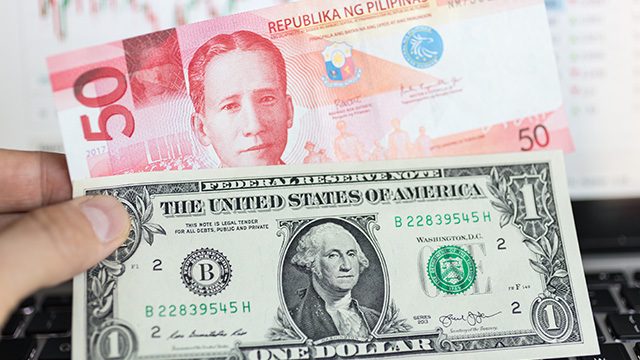SUMMARY
This is AI generated summarization, which may have errors. For context, always refer to the full article.

MANILA, Philippines – The Philippine peso weakened further against the dollar on Wednesday, September 12.
The peso closed at P54.13 against the greenback, the weakest in almost 13 years.
Analysts said the widening of the trade deficit in July to P3.55 billion contributed to the peso’s fall. (READ: Trade deficit balloons by 171% in July 2018)
Imports accelerated by 32%, while exports languished and grew only by a mere 0.3%.
Rappler columnist and University of the Philippines Diliman economics PhD candidate JC Punongbayan attributed the decline to the wider trade gap.
“The peso’s closing at P54 per US dollar is to be expected because of the continued double-digit growth of imports and the sluggish growth of exports,” Punongbayan said.
“It could also be partly because of the recent outflow of hot money on account of increasing interest rates in the US and jitters about runaway inflation,” he added.
The peso was also being crushed by rising oil prices, inflation reaching a fresh high of 6.4%, and fears of contagion from the emerging market rout.
“I think investors wanted more direction as to how the administration was going to address inflation from yesterday’s talk,” said Luis Limlingan of Regina Capital.
Limlingan was referring to the one-on-one chat that President Rodrigo Duterte had with Chief Presidential Legal Counsel Salvador Panelo. They tackled various issues, including the state of the economy.
Limlingan also said the peso’s fall was expected, as the currency already breached the P54 support level. (READ: Why is the Philippine peso the weakest in ASEAN?)
Meanwhile, Andrew Canobi of Franklin Templeton told Bloomberg that the government should take stronger steps to support the peso.
“The Philippines’ twin deficits worry us particularly in this environment, where rates in the US seem to be pushing higher, and there seems to be a real contest to attract capital flows,” Canobi said.
Bangko Sentral ng Pilipinas Governor Nestor Espenilla Jr earlier said he would “take all actions necessary to deal with speculative activity by market participants.” – Rappler.com
Add a comment
How does this make you feel?
There are no comments yet. Add your comment to start the conversation.